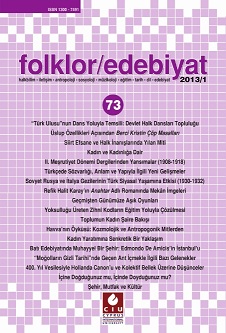Toplumun Kadın Şaire Bakışı
Social Perspective to Female Poets
Author(s): Türkân YeşilyurtSubject(s): Poetry, Social history, Gender history, Turkish Literature, Social development, Sociology of Education
Published by: Uluslararası Kıbrıs Üniversitesi
Keywords: Turkish poetry; woman; feminism; poet; Lady Leyla;
Summary/Abstract: Up to present in Turkish and world poetry, female poets have encountered various obstructions within their long-lasting adventure of literature. Entrance to universities was not possible for women, namely female poets, for a long while. Virginia Woolf criticizes women’s not being able to get university education. Likewise, the female poet Şükûfe Nihal, who was one of the first graduates of “İnas Darülfünûnu” (Ottoman University), divorced from her first husband as she was not been enrolled to the University on grounds that it would cause a problem for the continuation of her marriage. Unlike Şükûfe Nihal who belongs to superior class, Yaşar Nezihe who was born into a poor family was able to continue her life of education for only one year. When she reached school age, she carried on school keeping it a secret for her father who did not let her go to school; however her father expelled her from home upon realizing this situation. Ahmet Rasim expresses that women who get education are regarded with suspicion in society. Without any doubt, poem-writing of women, whose education life is not welcome, would not be appreciated at all. The poet Lady Fıtnat from Trabzon repines that her first husband prohibited her to write poems. A memory of Lady Leylâ involving the poet Lady Feride is just one example showing the women who deal with poems and literature are not only found odd by some men but also by some women. The women who are supposed neither to read nor write will slide into a dangerous area when they attempt to write about love. Indeed, the female writers who have written about love have exposed to reactions of family, relative, and literature circles. Because of the oppression that family and literature circles create on women, women have had to cope with their own censorship before any external censorship while writing related to love. Lady Fıtnat from Trabzon expresses that female writers are shy about speaking of their love. And one of the poets who torturously undergoes the influence of public is the Persian Poet Furûğ Ferruhzad. She had to abandon family home due to a gossip coming up because of a poem of hers. Mr. Necati has charged Mihri Hatun, who wrote “a nazire” (a poem modeled after another poem in respect to both content and form) to him with impertinence. Indeed, female writers would not be wished to see by male litterateurs even in the beginning. Besides, Ahmet Rasim confesses he did not want to accept that a woman might have written it when he read a poem of Lady Mihrünnisa. Ellen Moers mentions how exchanges of literary life support literature, and how the English and American female litterateurs who are deprived of this exchange suffer. Unlike England and the USA, “woman” based on a tradition in literary and social life in France until the 17th century. Despite this, Moliere made a female literary circle the object of satire in his art of work Gülünç Kibarlar. However, most female writers who do not give up writing in spite of all the obstructions, have not got the attention that they deserve, nor have they been duly appreciated. The poet Lady Şeref has thrown the unjustice that is made to female poets into sharp relief in her poems. Actually, the matter ought to be gathered in the centerof being a poet, not a woman or a man. Without any doubt, it is necessary to be against all distinctive approaches. However, it is a historical fact that women are prevented either explicitly or implicitly in the world of poem as well as other fields.
Journal: Folklor/Edebiyat
- Issue Year: 19/2013
- Issue No: 73
- Page Range: 177-184
- Page Count: 8
- Language: Turkish

